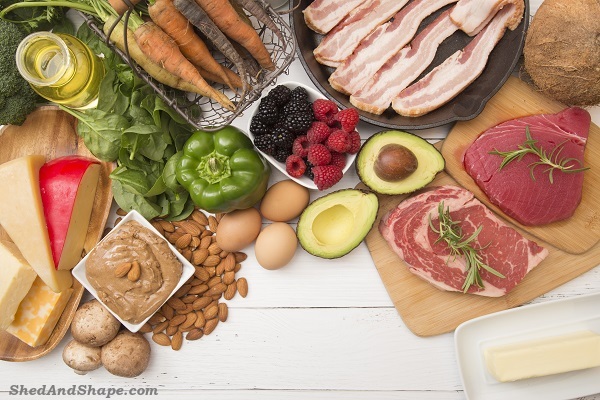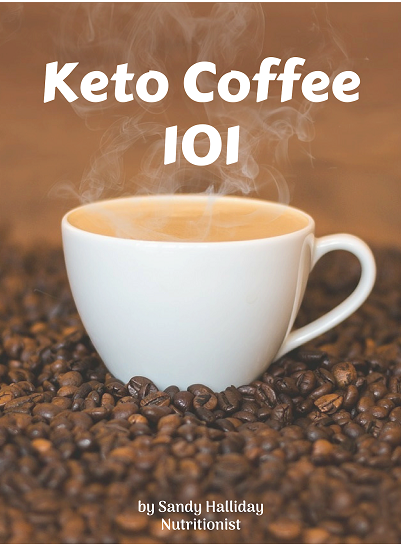There have been many controversies surrounding keto diet fats. Followers of keto must get most of their calories from fats to reach the state of ketosis and start losing weight. But some people have argued that eating lots of fats can be bad for our health.
In fact, we’ve been told for many years that fats, especially saturated fats, are bad for you and will only make you gain even more weight and cause heart disease. This is a myth that has now been scientifically disproved.
Too much fat may not be good for your health, but not all fats are bad. Let’s take a look at the many different types of keto diet fats, and identify the good and bad.
Importance of Fats for Keto
The keto diet is all about restricting carbohydrates and eating healthy fats, where up to 70% of your daily calories should come from fat. In doing so, your body will transition into ketosis. In this state, your body starts burning fats for energy instead of glucose which comes from the carbohydrates you normally eat.
Although the keto diet encourages the consumption of fats, you must focus on eating the healthier types of fats. Unfortunately, not many people are aware of this and often go overboard on bacon from intensively farmed pigs and foods containing processed and trans fats.
Kendra Whitmire, a nutritionist and dietitian in Laguna Beach who practices functional and therapeutic nutrition has said,
“Many people boil it down too simply and think they just need to eat a lot of fat and avoid carbs, but you can quickly eat an excessive amount of unhealthy fat on the keto diet.”
If you want to lose weight the healthy way, go for a variety of healthy fats. Aside from helping you to reach ketosis, these fats are anti-inflammatory and are good for your heart.
Related reading: Benefits of Fat for the Keto Diet
Best Keto Diet Fats To Eat
The fats you will find on a keto diet can be grouped into these categories:
• saturated fats
• monounsaturated fats (MUFAs)
• polyunsaturated fats (PUFAs)
• naturally-occurring trans fats
Saturated fats
You will be glad to know that the saturated fats that you can eat are red meat from grass- fed animals, grass-fed butter and ghee, heavy cream (preferably organic), pure lard, grass-fed tallow, good quality coconut oil, organic or pastured eggs, palm oil from a sustainable source.
Related reading: What’s so Good about Grass-Fed Meat?
Contrary to what used to be thought these fats can help raise HDL and lower LDL cholesterol levels so they are not to be feared.
Our cell membranes consist of up to 50% saturated fats which are needed for their proper function. They also play a part in immune system function and the calcification of our bones.
Unsaturated Fat
Unsaturated fats are some of the best keto diet fats to eat. They tend to be liquid when at room temperature although you can find unsaturated fat in meat and meat products.
There are two types of unsaturated fat, monounsaturated fats, and polyunsaturated fats.
Monounsaturated fat
Some of the best examples of monounsaturated fats are avocados, extra virgin olive oil, avocado oil, lard, unroasted nuts, and seeds. These fats can help to lower your risk of developing cardiovascular diseases.
Related reading: Health Benefits of Avocados on Keto
Polyunsaturated fat
On the other hand, polyunsaturated fats consist of omega-3 and omega-6 fatty acids. Some of the best sources are fatty fish, such as salmon, tuna, mackerel, etc. Polyunsaturated fats can help with muscle movement and prevent blood clotting.
Here are some examples of the best keto diet fats to eat.
1. Avocado – avocados are a great source of heart-healthy fats. They also provide an excellent dose of fiber. Avocados are also loaded with several vitamins and minerals, including potassium.
Potassium helps you to avoid the many symptoms that come with keto, including keto flu. This is a common symptom that takes place during the first few days of following the diet.
2. Olive Oil – Extra virgin olive oil is rich in phytonutrients and antioxidants such as flavonoids, phenols and anthocyanidins. It’s best to buy organic olive oil to avoid the pesticides that may get into other oils.
It’s probably not a good idea to cook with olive oil as it has a low smoke point. Better to use coconut oil or tallow (see below). Make a tasty salad dressing with it or drizzle over steamed low carb vegetables.
3. Coconut oil – Most of the fats in coconut oil are medium-chain triglycerides (MCTs), a type of fat that may help with fat burning.
Related reading: Does MCT Oil Help You Burn Fat?
Although you might read claims that coconut oil is bad for you because it can increase cholesterol levels it is not true in most cases. In fact coconut oil has been shown to lower LDL (bad) and increase HDL (good) cholesterol.
Related reading: Health Benefits of Coconut Oil for Keto
4. Chia Seeds and Flaxseeds – both seeds are rich in ALA omega-3 fatty acids with chia having slightly more than flaxseed. Eating more of these fats can improve the ratio of omega 6 and omega 3 that you consume, and this is important to stay healthy.
The seeds are loaded with fiber, which is good for keto. Keto is strictly low in carbs, so it can be difficult to get enough fiber into your diet. Not eating enough fiber could lead to low carb constipation.
To use chia seeds you can make chia pudding, add them to low carb smoothies or yogurt, or sprinkle them on salads for extra crunch.
Flaxseeds are not as easily digested as chia seeds so it’s best to grind them before use or buy flax meal. You can add ground flaxseed to smoothies, use flaxmeal in keto bread recipes, or use flax oil on salads or vegetables.
5. Grass-fed Beef Tallow – Tallow (dripping) has made a comeback recently especially with the carnivore diet enthusiasts. Before the creation of vegetable cooking oils tallow was the fat mostly used for cooking.
It’s made by slowly cooking animal fat (suet) from grass-fed animals until it becomes liquid. It’s then strained and allowed to cool. This rendered fat can then be poured into glass jars and kept in the fridge.
It is a very nutritious fat as it contains a good array of nutrients including conjugated linoleic acid (CLA), vitamins A, D, E, K2, B vitamins, niacin, iron, selenium, potassium, riboflavin, and phosphorus.
Although it’s claimed that CLA can increased body fat loss there is some controversy over it. Interestingly it is a naturally occurring trans fat. This means that it’s not bad for you.
Grass-fed beef might have less fat compared to grain-fed beef, but it has a lot more omega-3 fatty acids and conjugated linoleic acid, both of which are linked to a host of health benefits.
If you have not added tallow to your diet yet then I recommend that your try some. It is good for your skin too. Some have gone as far as saying it’s nature’s Botox!
Worst Keto Diet Fats To Eat
Processed trans fat (hydrogenated) and processed vegetable oils are probably the worst kind of fats you can eat on a keto diet.
Researchers have shown that hydrogenated trans fats are linked to heart disease, obesity, cancer, mental disorders and many other conditions.
Here are some examples of the worst fats to eat on keto.
1. Processed Meats – processed meats like regular bacon, ham, and hot dogs could put you at a higher risk of developing heart disease. These foods contain a high amount of salt, nitrate, and unhealthy fats, which can all lead to arterial stiffening.
2. Intensively Reared Meat – Intensively reared animals are fed unhealthy diets and the meat is much different than meat from grass-fed animal. It’s lower in omega 3 fatty acids.
3. Margarine – Margarine contains an unhealthy combination of saturated and trans fats that have been linked to various illnesses.
Final Thoughts
The keto diet has been very successful for many people who want to lose weight quickly. It has a lot of other health benefits but for the health effects you have to choose the right fats to eat.
It’s important not to overboard with them as they are high in calories. If you want to lose weight while staying healthy in keto, you should be mindful of the type of fats to incorporate in your diet.
You can still have some saturated fats in your diet but opt for high-quality animal sources. When it comes to unsaturated fats, avoid those that are processed. Focus more on eating fats with good sources of omega-3s.
There are so many ways to incorporate healthy keto diet fats into your diet. You can have avocado in a keto smoothie, use extra virgin olive oil for your salad dressing and drizzle it over vegetables, use coconut oil in your keto coffee, or use grass-fed beef tallow for frying.










